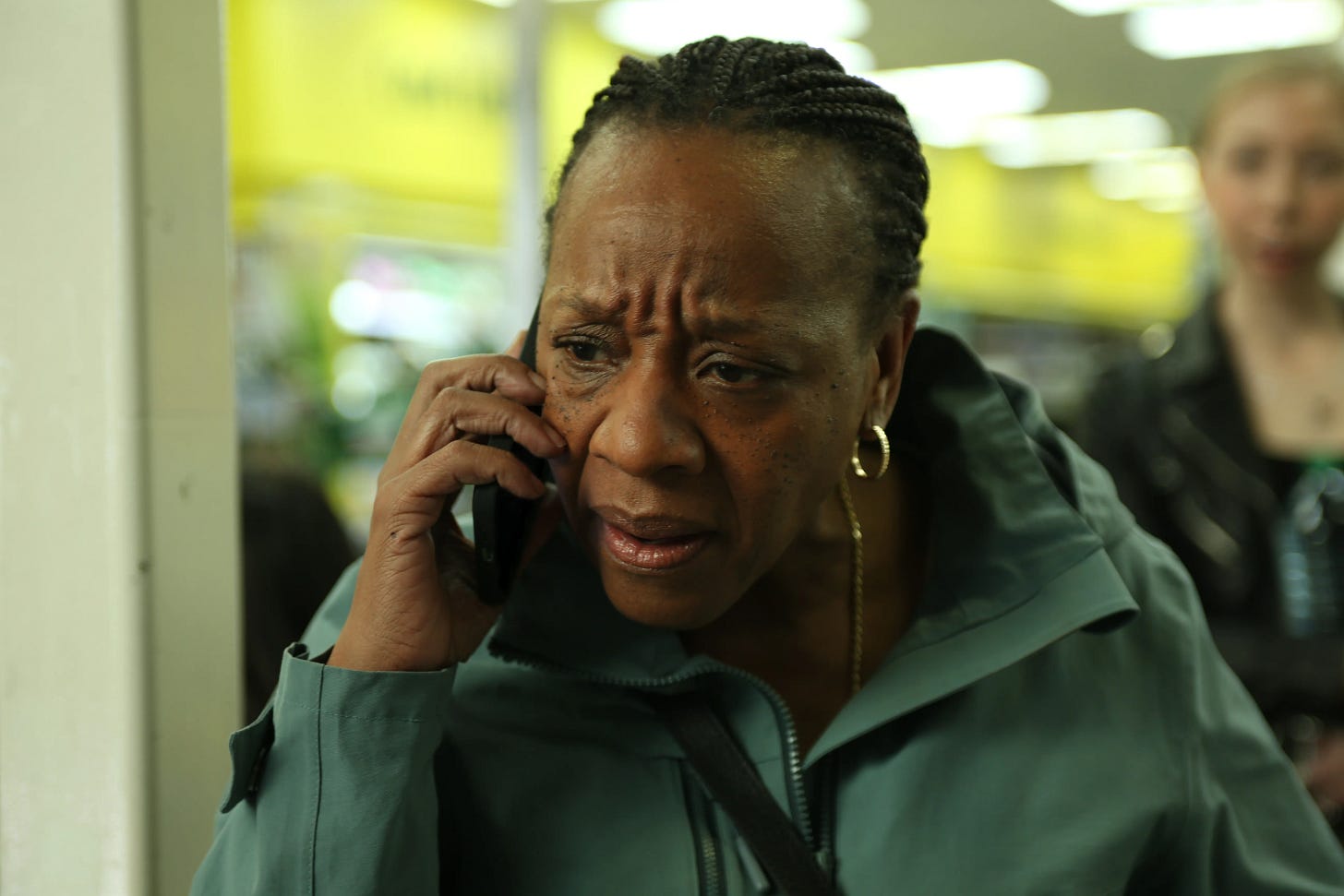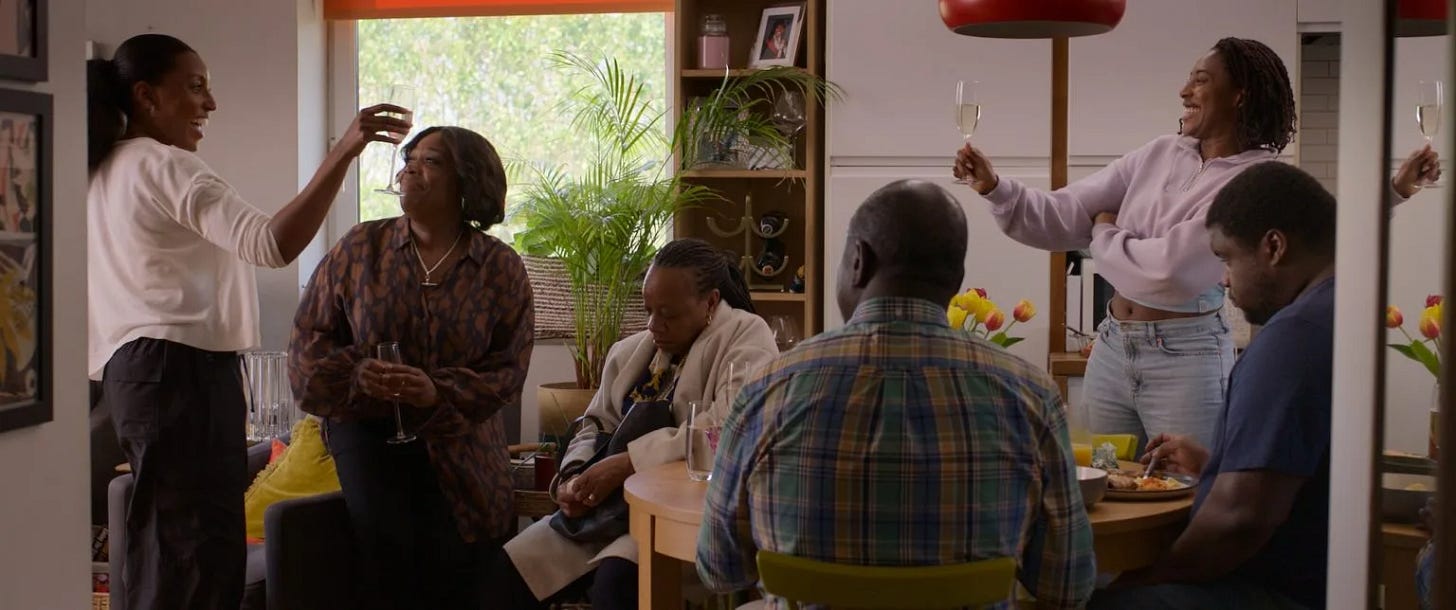Mike Leigh has returned. After years of struggling to secure funding after two underwhelming big-budget period films (Mr. Turner and Peterloo), it’s been rough goings for the maverick English filmmaker. Renowned for his mastery of the British kitchen sink genre and his stark, unflinching sensibilities, Leigh has crafted independent classics such as Naked, Secrets & Lies, and Happy-Go-Lucky. However, his slow, meditative style has not been met with cheers from distributors and producers, as Netflix was one of many studios that rejected Leigh’s attempt to get back in the saddle. It didn’t help that major festivals where Leigh has won top prizes (Cannes and Venice) flatly rejected his latest. But, he found a way. Hard Truths premiered to rapturous acclaim at TIFF this past Fall and is now playing nationwide in theaters. So, is this a return to form for Mike Leigh? Or should Leigh hang it up?
What’s it all about?
Hard Truths centers around Pansy Deacon (Marianne Jean-Baptiste), a perpetually depressed and anxious woman whose short temper lands her in whirls of trouble with everyone around her. She picks fights with customer service employees constantly, either criticizing their appearance or lack of “bedside manners”. She’s afraid to go outside and is deathly afraid of animals and plants. Her marriage to a meek plumber Curtly (David Webber) is fraught with friction from Pansy’s constant complaining. Their only son Moses is 22 is overweight and aimless, barely able to withstand his mother’s badgering each and every day. On the other hand, her sister is a content hairdresser whose husband left her but managed to raise two well-adjusted, working daughters. The film’s slice-of-life style, a staple of Mike Leigh’s films, sees Pansy go about her day-to-day life up until Mother’s Day. Pansy’s belligerent about visiting her mother’s grave and spending time with her sister. The remainder of the film thoughtfully explores Pansy’s struggles with her deep-seated fears and her belief that her family despises her.
Bloody Brilliant Performances
Marianne Jean-Baptiste is downright fantastic. It takes a truly brilliant actor to make such an unlikeable character sympathetic. And despite playing a character swimming in misery, she manages to accentuate the humor of her irrational behavior. Her outbursts and hostility are exhausting for the audience, yet you can't help but laugh. The energy she brings to every one of her tirades takes intense commitment. Mike Leigh masterfully paces the film, balancing her presence appropriately, and depicting her conflicting nature adeptly. He limits the time spent on Pansy, striking a balance that avoids annoyance while still allowing the audience to grasp her broader impact on those around her. While the film establishes her overbearing personality, we’re able to see how debilitating it is for her as well. Baptiste internalizes all the insecurities, anxieties, and deep-seated fears that drive her extreme neuroses, trapping herself in a constant prism of fear. For a character who intentionally keeps people at a distance for fear they hate her, Baptiste implies a complicated past that will never relinquish its hold. Leigh’s approach of letting his actors explore their roles through rigorous improvisation allows Baptiste to embody her character fully. In one particularly emotional scene, she seamlessly transitions from laughter to tears in a way that only truly great performers and confident directors can achieve. The supporting cast is also wonderful and I applaud them for balancing the firepower of Pansy’s presence. Especially those in her immediate family whose blank expressions convey so much more than words. Michelle Austin plays the compassionate, caring sister with her two well-adjusted daughters, giving the film a much-needed seesaw toward normalcy and decency in an otherwise morose tale.
What a Pansy
Hard Truths at the end of the day is a deeply somber, raw character study that’s the perfect counterpart to Leigh’s Happy-Go-Lucky. While the character in the latter is someone we aspire to be, Pansy is the one we find in the wild more often than not. She’s on a completely different spectrum of misery that can border past absurd into nut-ville. Every moment with her is nauseating echoing the “toxic people” self-help gurus advise people to weed out of their lives. The ones who don’t demand sympathy. Leigh thinks otherwise. Exploring those who decide to look at life glass half-empty, he bravely shines an x-ray at a woman whose malady is all too commonplace. Pansy is a textbook case of depression where you feel her unwillingness to leave home or partake with anyone, living in a constant state of paranoia. She’s unable to relax and endures the world's weight on her shoulders. Having family members who struggle with similar challenges, it takes a deeply compassionate filmmaker who acknowledges the fine nuances of the human condition to craft such an empathetic character study. It’s easy to dismiss these people but the source of their unhappiness exists in all of us in smaller measures. Leigh is unafraid to unravel what drives us as a collective to such behavior.
Mike Leigh
I sat in a theater with an audience of 3 including myself and after the film ended, the two middle-aged women who happened upon Hard Truths in their weekly movie trips motioned to me for my opinion. I told them that it’s very true to Mike Leigh’s style and that’s how all his films feel. Safe to say it didn’t suit the American tendency to have everything wrapped in a finely tied bow. I’ll admit that I haven’t sunk my teeth too deep into Leigh’s filmography but the films I have seen inspire me all the more. His pictures have a gentle, slight touch that brings the best out of everyone involved. Some may accuse him of being stagey or too performance-heavy, yet his mise-en-scene and sense of camera transcend stage-bound theatrics. Leigh always gathers the best reactions and understands where the camera needs to be in relation to the character every time. So many filmmakers are obsessed with cool gimmicks, fancy equipment, barrages of neon light, and unnecessary camera movements that they forget the tenets of basic storytelling and character development. In filmmaking, capturing the essence of a simple conversation is one of the greatest challenges—and Mike Leigh is a true master of it. Despite his largely pedestrian style devoid of flash, I believe he is one of the rare filmmakers who creates fully realized worlds, driven by a deep sensitivity and keen understanding of the quiet turbulence amongst the working class.
Too much quiet?
My only real complaint with Hard Truths comes towards the end of the third act where it falters into a series of quiet moments of grief and disconnection that don’t bring the film to a meaningful halt. While I don’t share the point of view of my fellow theater audience that the film was pointless, there’s still some truth (a hard truth?) in that. Leigh cheapens out a bit. Hard Truths was not headed for a satisfying conclusion by any means. However, he doesn’t know exactly where to land the film opting for several instances of characters sitting around looking forlorn, creating more atmosphere rather than steering the plot or characters somewhere new. Given how much we care about these ingeniously conceived characters, I felt there needed to be a push toward some kind of progress or a larger takeaway even if this is one of Leigh’s least plot-driven works. The film just lays down like a dog. Even his more recent kitchen-sink dramas like All or Nothing or Happy-Go-Lucky had a certain narrative push or change in the characters’ lives yet we still knew in the back of our heads that the characters may revert to their pitfalls following the final frame.
It’s still great.
Despite Leigh’s slight flubbing of the third act, he’s given us another wonderful entry into his storied filmography. Perhaps there’s more to the third act that I missed but one thing I know for certain is that despite its startling compassion, Hard Truths remains one of Leigh’s colder visions. Additionally, given how his films are constructed, the actors deserve equal credit in crafting them as well. Through a series of structured improvisations, Leigh freely finds the inner truth of his characters and world in a collaborative process unheard of. The true mark of a confident filmmaker and a brilliant cast. Returning to the kitchen sink drama, Leigh has found his groove once more. Let’s hope he’s got more in the tank.









Having just seen it I feel I can weigh in now. I largely agree with you and I wonder at the characterisation of the movie by the other audience members as "pointless" - it most definitely has a point, that living with depression is hard work for all who are contact with it. What I think they mean by that is that it doesn't have *a redemption arc* - people with patience are generally prepared to go through a lot of heartache a la Manchester by the Sea if they feel at the end the hard work has been rewarded and there's a glimmer. In rejecting that, Leigh deliberately sets himself up against the drama-arc as conventionally established.
I tend to disagree about the contemplative scenes in her living room in the mid-section. I think they were the best bits and showed a great power of unhurried and restrained camerawork. Conversely, the scenes with Pansy's nieces at work and at a bar were by far the weakest, a completely unjustified set of scenes in the dramatic sense - these really were pointless, IMO.
Very happy that you're willing to review world cinema, AY!
My Letterboxd review of this one, if you're interested
https://letterboxd.com/hootsmaguire/film/hard-truths-2024/
Very complete analysis!